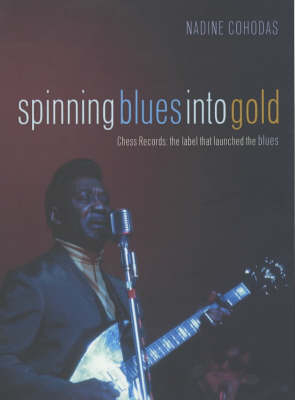
Spinning Blues into Gold
The Chess Brothers and the Rise of the Blues
Seiten
2001
|
New edition
Aurum Press (Verlag)
978-1-85410-781-7 (ISBN)
Aurum Press (Verlag)
978-1-85410-781-7 (ISBN)
- Titel ist leider vergriffen;
keine Neuauflage - Artikel merken
Nadine Cohodas traces the history and development of the legendary record label, Chess Records. This is a biographical account of the success of the founders, Polish immigrants Leonard and Phil Chess and the story of a blending of cultures.
Occasionally the course of musical history is changed not by a performer or a band, but by a record label. It was Sun Records that brought us rock'n'roll; Blue Note is forever identified with jazz; Motown even gave its name to a brand of soulful pop. And where the blues is concerned, one Chicago label was responsible for bringing all the great musicians to the world's attention: Chess. The roll-call of artists that Chess discovered is impressive: Muddy Waters, Chuck Berry, Bo Diddley, Howlin' Wolf, Etta James, Buddy Guy, Willie Dixon, Little Walter, Sonny Boy Williamson...The list of classic songs is even longer: 'No Particular Place to Go'; 'I've Got My Mojo Working'; 'I'd Rather Go Blind'; 'Smokestack Lightning'; 'Hoochie Coochie Man'; 'Promised Land'; 'Roadrunner'. No wonder that the young Rolling Stones, touring America, wanted to visit and record at the shrine itself; Chess's ramshackle Chicago studios. Now Nadine Cohodas has written the first full-length, comprehensive account of this remarkable cultural phenomenon, and a colourful story it is, too.
For Chess, whose achievement was to take the folk music of black Americans, hitherto ghettoised and dismissed as 'race records', and electrify and urbanise it for a universal audience, was set up and run by two Polish immigrants. Moreover, Leonard and Phil, the two Chess brothers, had no musical training, and little appreciation - they came to record production through running a liquor store, a rackety nightclub and then a radio station. They had a frequently fractious relationship with some of their biggest acts, and posterity has since questioned the fairness and financial propriety with which they treated their performers - a casual gift of a new Cadillac and a few smart suits, it seems, could buy off years of underpaid royalties. But with plenty of chutzpah and a hard-nosed business acumen, they made people like Muddy Waters famous the world over. Nowadays, hardly a month goes by without a famous Chess song like 'I'm a Man' or 'Smokestack Lightning' cropping up on the soundtrack to a car or whisky commercial. It's not an overstatement to say that - from the Stones to Led Zeppelin to Primal Scream - without Chess, there would be no rock music as we now know it.
Occasionally the course of musical history is changed not by a performer or a band, but by a record label. It was Sun Records that brought us rock'n'roll; Blue Note is forever identified with jazz; Motown even gave its name to a brand of soulful pop. And where the blues is concerned, one Chicago label was responsible for bringing all the great musicians to the world's attention: Chess. The roll-call of artists that Chess discovered is impressive: Muddy Waters, Chuck Berry, Bo Diddley, Howlin' Wolf, Etta James, Buddy Guy, Willie Dixon, Little Walter, Sonny Boy Williamson...The list of classic songs is even longer: 'No Particular Place to Go'; 'I've Got My Mojo Working'; 'I'd Rather Go Blind'; 'Smokestack Lightning'; 'Hoochie Coochie Man'; 'Promised Land'; 'Roadrunner'. No wonder that the young Rolling Stones, touring America, wanted to visit and record at the shrine itself; Chess's ramshackle Chicago studios. Now Nadine Cohodas has written the first full-length, comprehensive account of this remarkable cultural phenomenon, and a colourful story it is, too.
For Chess, whose achievement was to take the folk music of black Americans, hitherto ghettoised and dismissed as 'race records', and electrify and urbanise it for a universal audience, was set up and run by two Polish immigrants. Moreover, Leonard and Phil, the two Chess brothers, had no musical training, and little appreciation - they came to record production through running a liquor store, a rackety nightclub and then a radio station. They had a frequently fractious relationship with some of their biggest acts, and posterity has since questioned the fairness and financial propriety with which they treated their performers - a casual gift of a new Cadillac and a few smart suits, it seems, could buy off years of underpaid royalties. But with plenty of chutzpah and a hard-nosed business acumen, they made people like Muddy Waters famous the world over. Nowadays, hardly a month goes by without a famous Chess song like 'I'm a Man' or 'Smokestack Lightning' cropping up on the soundtrack to a car or whisky commercial. It's not an overstatement to say that - from the Stones to Led Zeppelin to Primal Scream - without Chess, there would be no rock music as we now know it.
Nadine Cohodas is author of two other music books about the American South.
| Zusatzinfo | 8pp b&w photographs |
|---|---|
| Sprache | englisch |
| Maße | 156 x 234 mm |
| Gewicht | 596 g |
| Themenwelt | Literatur ► Biografien / Erfahrungsberichte |
| Kunst / Musik / Theater ► Musik ► Jazz / Blues | |
| ISBN-10 | 1-85410-781-X / 185410781X |
| ISBN-13 | 978-1-85410-781-7 / 9781854107817 |
| Zustand | Neuware |
| Haben Sie eine Frage zum Produkt? |
Mehr entdecken
aus dem Bereich
aus dem Bereich
zur politischen Ästhetik des Jazz
Buch | Hardcover (2023)
Phillip Reclam (Verlag)
38,00 €
Die Geschichte des Jazz in Deutschland
Buch | Softcover (2021)
Reclam, Philipp (Verlag)
20,00 €


